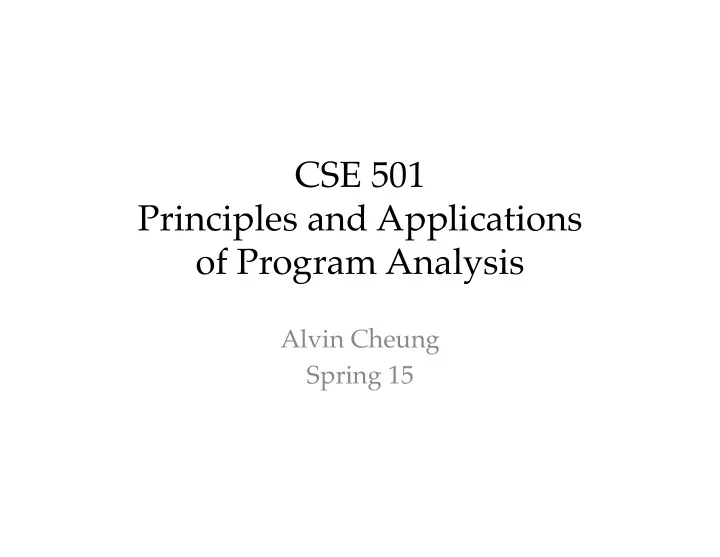

CSE 501 � Principles and Applications � of Program Analysis � � Alvin Cheung � Spring 15 �
Welcome to CSE 501! �
The Cast �
J K J h Q , D , σ , h i , e K ! h Q 0 , D 0 , σ , h 0 i , ( σ 0 , e ) force( Q 0 , D 0 , ( σ 0 , e )) ! Q 00 , D 00 , False J h Q 00 , D 00 , σ , h 0 i , s 2 K ! h Q 000 , D 00 , σ 0 , h 00 i J h Q , D , σ , h i , if( e ) then s 1 else s 2 K ! h Q 000 , D 000 , σ 0 , h 00 i J h Q , D , σ , h i , s K ! h Q 0 , D 0 , σ 0 , h 0 i Instructor � J h Q , D , σ , h i , while(True) do s K ! h Q 0 , D 0 , σ 0 , h 0 i J h Q , D , σ , h i , e K ! h Q 0 , D 0 , σ , h 0 i , ( σ 0 , e ) force( Q 0 , D 0 , ( σ 0 , e )) ! Q 00 , D 00 , v update( D 00 , v ) ! D 000 Alvin Cheung � ⇢ D 000 [ Q 00 [ id ]. s ] if Q 00 [ id ]. rs = ; 8 id 2 Q 00 . Q 000 [ id ] = Q 00 [ id ]. rs otherwise CSE 530 � J h Q , D , σ , h i , W ( e ) K ! h Q 000 , D 000 , σ , h 0 i �
TA Extraordinaire � Andre Baixo � Office hours: TBD �
You! �
Course Communication � • Discussion board � – HW help � – Find project partners � • Course website: � courses.cs.washington.edu/501 • Email: cse501-staff@cs.washington.edu
Course Goals � • What are the techniques used to understand programs? � – Mix of classical and recent advances � • What can we use these techniques for? � – Variety of applications across different domains � • How do we build tools that utilize such techniques? �
Course Goals � • How to do research? � – How to choose problems � – How to devise solutions � – How to evaluate � – How to report results �
Course Non-Goals � • How to build a compiler from scratch � – Check out CSE 401 � • What are all the compiler optimizations out there? � – Check out list of references on website � • Cover all research topics in program analysis � – 35 years of PLDI but we only have 10 weeks! �
Class Format � • Two class meetings per week � – Tuesday and Thursday 11am – 12:20 pm � – Here! � • Occasional HW help and project feedback sessions �
Class Format � • We will discuss 1-2 research papers during each class meeting � – Please read them beforehand � – We ask you to write a small commentary before class to share with everyone � – Be prepared to ask questions! �
Grading � • Programming assignments (30%) � – Get to know available tools out there � – No late days � • Project (50%) � – Open-ended: find problems in your research area � – Work with a partner � – We will provide you with potential ideas � – Project milestones, end-of-quarter presentation, final report � • Paper summaries (20%) � – Submit paper summary 24-hrs before lecture � – See details on course website �
Course Topics � • Dataflow frameworks � • Abstract interpretation � • Domain-specific languages � • Program verification � • Dynamic analysis �
Course Topics � • Dataflow frameworks & abstract interpretation � – Pointer analysis � – Compiler optimizations � – Information flow � – Detecting malware � • Domain-specific languages � – Parallel programming � – High-performance computing � – New hardware � �
Course Topics � • Program verification � – Finding program invariants � – Provably-correct compilers � • Dynamic analysis � – Program testing � – Model checking � • Compiler construction �
Prerequisites � • Coding � • Data structures � • Mathematical logic � • [Optional] Knowledge about compilers �
Now the fun begins… �
Why understand programs? � • We all write code! � • It’s good to get some understanding about what we are coding � • It’s good to develop a formal framework for understanding programs � • It’s good to have somebody else do this for us, perhaps automatically �
Recommend
More recommend